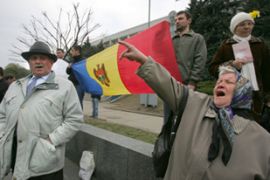Moldova begins election recount
Votes from disputed parliamentary poll recounted, amid boycott calls from opposition.

Opposition boycott
Moldova’s three main opposition parties said on Tuesday that they would boycott the recount, claiming the elections were rigged before the voting took place.
“Taking part in a recount will only legitimise the result of the elections and prevent us from checking the electoral lists,” they said in a statement.
| In depth |
|
|
They allege that the ruling Communist party added 400,000 people to voting lists, including dead people and people living abroad.
The constitutional court, which agreed to the move, said earlier in the week that voters’ lists would be re-examined during the recount.
The vote, in which the ruling Communist party won about 50 per cent, was given a clean bill of health by election monitors from the Organisation for Security and Co-operation in Europe.
But its outcome led to violent protests by anti-Communist activists in Chisinau, the capital, in which one person died, and about 90 people were injured. Another 200 people were arrested.
Amnesty call
Voronin called for an amnesty on Wednesday for people detained while taking part in the demonstrations.
In a televised address to the nation, Voronin said: “I call on the competent bodies to carry out a general amnesty and call for an end to all forms of prosecution against participants in street protests.”
However, the president said legal action would be taken against “criminal elements and repeat offenders”.
Voronin has accused neighbouring Romania of stoking the demonstrations, a charge Bucharest has denied.
Traian Basescu, Romania’s president, called on Tuesday for a European investigation into the protests in Moldova, criticising the government for “repression”.
He said there had been “violations of human rights and freedom of expression” in Moldova in recent days.
Edwin Berry, human rights adviser to the United Nations in Moldova, also raised concern over the treatment of Moldovan citizens.
He described the treatment of people detained after the riots as “degrading”, saying they lacked medical and legal assistance.
Mirek Topolanek, the Czech prime minister, whose country holds the European Union presidency, will next week make the first high-level EU visit to Moldova since the protests.
